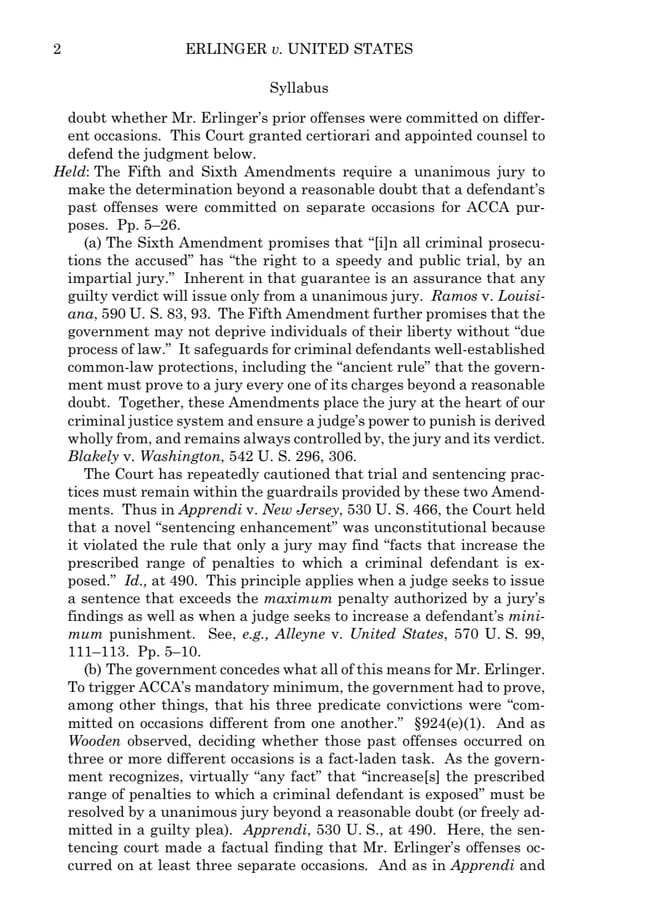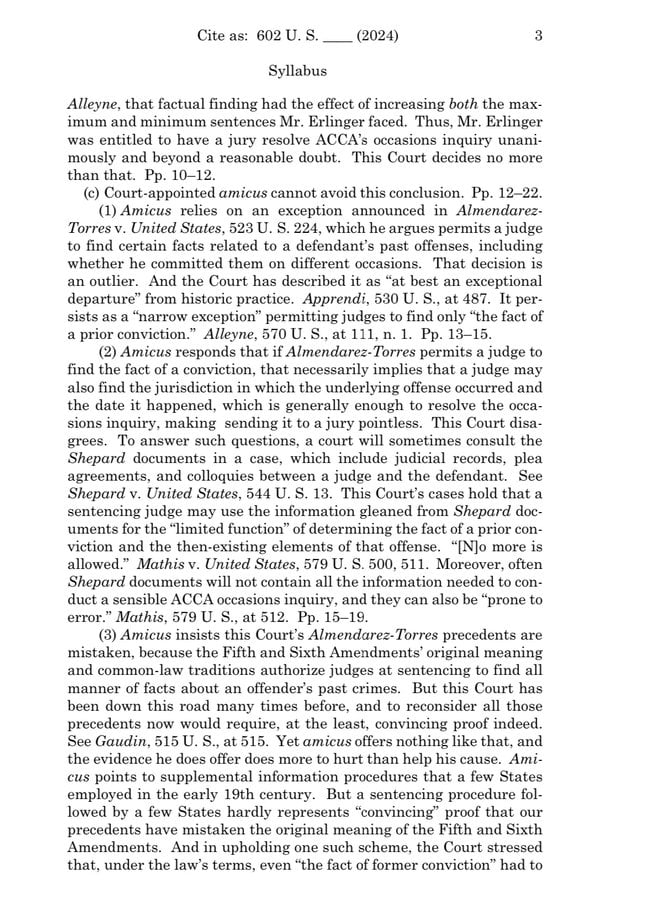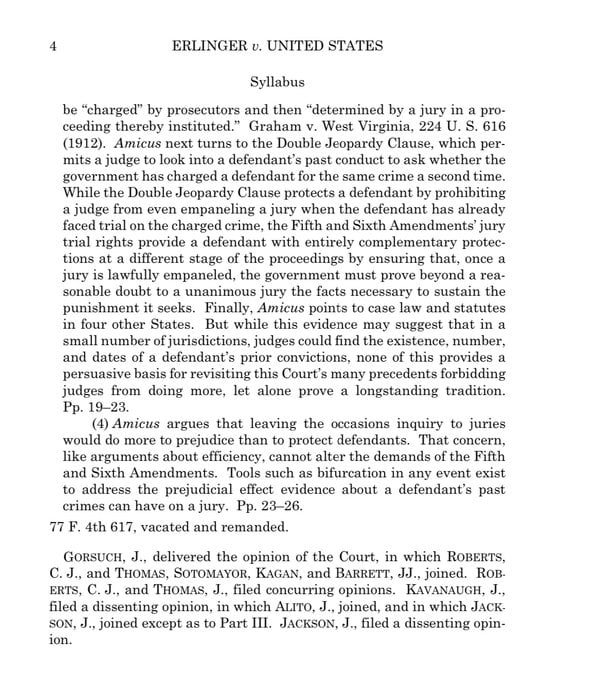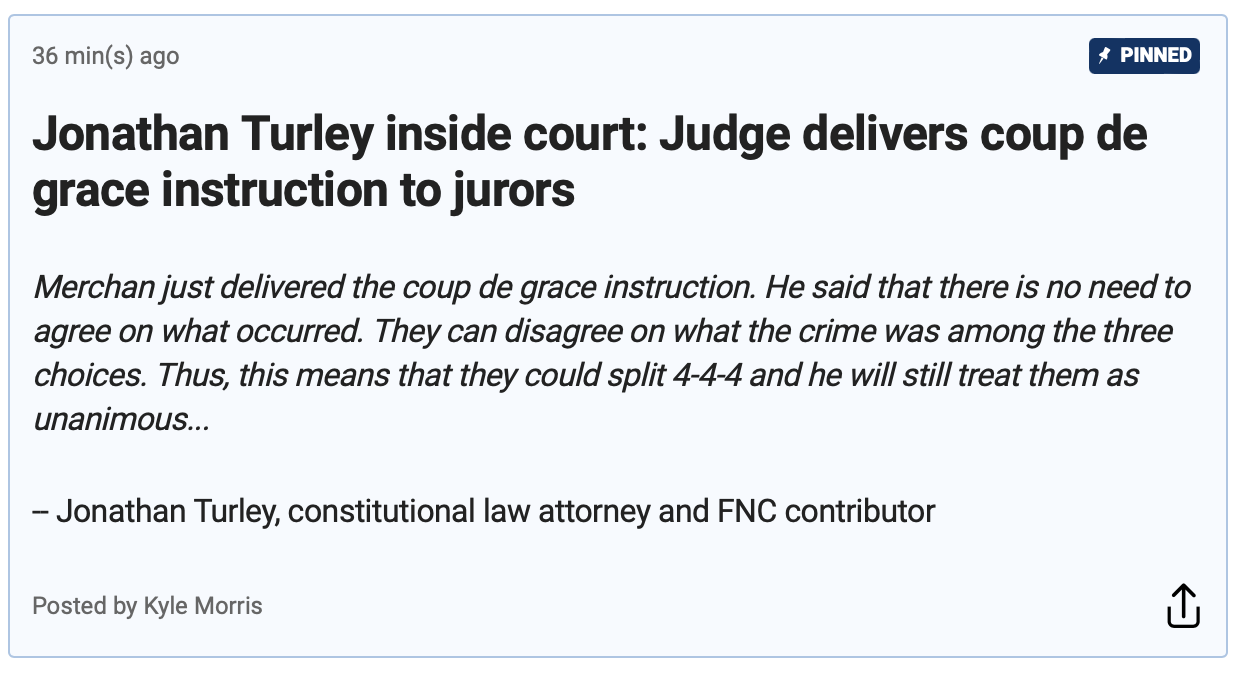In an uncommon move, the Supreme Court has just opted to extent their current term into July.
The reason for this is so that SCOTUS can wrap up work on around a dozen important cases — including President Trump’s immunity case and major rulings on federal agency power, abortion, social media censorship, gun rights, and J6.
Final 10 cases of SCOTUS term include major decisions on Trump, J6 cases and social media censorship.
Ten major case decisions remain before the Supreme Court, all of which are set to be released before the term comes to a close at the end of June. Many of these decisions will… pic.twitter.com/KHGDr7VVAa
— OutsideTheMatrix aka QRASH (@PaTrumpGirl) June 24, 2024
The US Supreme Court signaled it will take the unusual step of extending its term into July as it finishes work on about a dozen cases, including Donald Trump’s bid for immunity from prosecution for attempting to overturn his 2020 election loss. https://t.co/iws6zyxl28
— Bloomberg (@business) June 24, 2024
Such a thing rarely happens, and this news, combined with the fact that fences have recently been installed around the Supreme Court has us wondering what big decision is about to drop…
Fences or no fences…
Did you know that the Supreme Court is still in their 2023 term?
What ruling MIGHT necessitate the need to erect fences around the Supreme Court? pic.twitter.com/C6kNAU39Wc
— Cowboyw2b (@Cowboyw2b2) June 18, 2024
BNN Bloomberg has more details on the Supreme Court’s term extension:
The US Supreme Court signaled it will take the unusual step of extending its term into July as it finishes work on about a dozen cases, including Donald Trump’s bid for immunity from prosecution for attempting to overturn his 2020 election loss.
ADVERTISEMENTThe court, which had already scheduled Wednesday as an opinion day this week, updated its website to show it will issue rulings on Thursday and Friday as well. Because Chief Justice John Roberts traditionally announces the last day of the term from the bench, the announcement indicates the Friday opinions won’t be the last ones.
In addition to the Trump case, the court will be ruling on abortion, regulatory power and social media in the coming days. Many of those decisions are likely to be deeply divisive, a factor that might be contributing to the delay.
Reuters broke down some of the major cases the Supreme Court will be deciding on:
The U.S. Supreme Court’s current term features major cases involving former President Donald Trump’s claim of immunity from prosecution and his ballot disqualification, the abortion pill, gun rights, the power of federal agencies, social media regulation and Purdue Pharma’s bankruptcy settlement.
Federal Agency Power
The Supreme Court will rule on a 40-year doctrine known as the Chevron doctrine. The precedent dictates that courts should defer to executive branch agencies’ expertise when it comes to interpreting laws when Congress’s intent in passing the law is unclear.
Under the 1984 doctrine, U.S. courts gave great leeway to agencies such as the Environmental Protection Agency (EPA) and the Securities and Exchange Commission (SEC) regarding the powers delegated to them by Congress to administer the law.
Two small fishing companies have challenged that precedent, claiming that paying for a monitor on a herring boat required by the National Marine Fisheries Service amounted to onerous regulation. As the case illustrates, the ruling will affect not only the EPA and the SEC but also myriad other federal agencies.
In oral arguments earlier this year, the justices appeared divided over a bid to further limit the regulatory powers of federal agencies in a dispute involving the government-run program to monitor for overfishing of herring off New England’s coast.
The lower court rulings allowed the National Marine Fisheries Service to require commercial fishermen to help fund the program. Two fishing companies—New Jersey-based Loper Bright Enterprises and Rhode Island-based Relentless Inc.—have argued that Congress did not authorize the agency, part of the Commerce Department, to establish the program.
Trump Immunity Case
Another case that will likely be ruled on this week involves former President Trump, who had argued that he should be declared immune for his activity after the 2020 election to deal with what he described as election fraud. Special counsel Jack Smith last year charged the former president with conspiracy to subvert the 2020 election, and the former president has appealed the case to the high court.
During arguments, the justices appeared skeptical of the Trump attorneys’ arguments that he should be fully immune from prosecution. But some of the justices seemed inclined to carve out some immunity for presidents. Several justices offered warnings that all future former presidents could be prosecuted by their successors if immunity is not upheld.
ADVERTISEMENTThe appeal has delayed the criminal case against former President Trump in Washington related to the Jan. 6, 2021, Capitol breach. He has pleaded not guilty to the charges.
Social Media Contacts
In another major case, the court will have to decide whether federal government officials should be broadly prohibited from communicating with social media companies, responding to lawsuits by two state attorneys general alleging that the federal government violated people’s First Amendment rights by asking social media companies to take down content that it claimed was false or misleading.
The attorneys general had some success in the lower courts. The U.S. Circuit Court of Appeals issued a decision that blocked officials in the FBI, the Centers for Disease Control and Prevention, the Surgeon General’s office, the White House, and other agencies from contacting social media firms.
The Biden administration appealed the Fifth Circuit’s decision, sending it to the Supreme Court. The circuit’s decision is currently on hold while the high court weighs the matter.
A number of Supreme Court justices during arguments in March appeared skeptical that government officials should be barred from contacting those companies.
Abortion
Although the Supreme Court already ruled on a challenge to the Food and Drug Administration’s approval of an abortion-related drug, the high court is set to release an order on whether emergency rooms in Idaho can perform abortions on pregnant women during what is described as an emergency.
Under the 2022 Idaho Defense of Life Act law, abortion is banned under all circumstances unless it is “necessary to prevent the death of the pregnant woman.”
The Biden administration had challenged the mandate, saying it conflicts with a federal law, the Emergency Medical Treatment and Labor Act, which mandates that emergency room doctors stabilize patients.
ADVERTISEMENT
So far, the Supreme Court’s extension includes the week of July 4…
So, get ready for some huge rulings to celebrate Independence Day!
It’s gonna be a biggie!
RELATED REPORT:
HUGE: Supreme Court Issues MAJOR Ruling That Could Immediately Reverse Alvin Bragg’s Case Against Trump!
The Supreme Court has been handing down several big rulings recently, and several even bigger ones are still yet to come.
But one especially notable ruling didn’t get nearly the attention it deserved.
In fact, I’m not seeing many people talking about this, but we definitely will.
The case is called Erlinger v. United States, and in that case the Supreme Court ruled that the Fifth and Sixth Amendments require a unanimous jury to make the determination beyond a reasonable doubt that a defendant’s past offenses were committed on separate occasions for purposes of the Armed Career Criminal Act (ACCA). The Court vacated and remanded the case for further proceedings.
Ok so what, you ask?
What’s the big deal?
Well, only that this may have a direct impact on so-called “Hush Money” case against Trump, involving Alvin Bragg and Judge Merchan.
Do you recall in that case that Judge Merchan gave very strange Jury Instructions that basically told the jurors they did not have to unanimously agree on what underlying crime President Trump allegedly committed?
It was so strange.
I’ll post our full coverage of it down below, but for right now I had Grok give a quick summary:

Ok, so now apply the Erlinger case.
I think Sean Davis describes it well right here:
In 6-3 decision issued today, the Supreme Court ruled that 1) a jury must be unanimous in its findings on criminal convictions, and 2) sentencing enhancements cannot be arbitrarily implemented by judicial fiat.
The ruling and the rhetoric in the opinion have obvious implications for both the illegal Bragg witch trial against Trump in New York City and the bogus J6 1512(c) charges and sentencing enhancements that corrupt federal judges have announced they will implement if the Supreme Court nukes 1512(c).
In 6-3 decision issued today, the Supreme Court ruled that 1) a jury must be unanimous in its findings on criminal convictions, and 2) sentencing enhancements cannot be arbitrarily implemented by judicial fiat.
The ruling and the rhetoric in the opinion have obvious… pic.twitter.com/2QsT71Hrh7
— Sean Davis (@seanmdav) June 21, 2024




Ok folks, so does that mean Judge Merchan’s Jury Instructions were flawed?
I mean, we told you they were DEEPLY FLAWED at the time it happened.
And now it’s a beautiful thing when the Supreme Court just issued an opinion that seems to back us up!
Let’s see what happens, this just got VERY interesting!
There’s a reason why over 5 million people each month trust our reporting here at WLTReport.
Here’s what we originally told you back when the Jury Instructions were made public:
Judge Merchan Gives Insane and Unconstitutional Jury Instructions To “Get Trump”
Judge Merchan Gives Insane and Unconstitutional Jury Instructions To "Get Trump"
Constitutional law attorney and Fox News contributor Jonathan Turley is covering the jury instructions in the so-called "Hush Money" case against Trump this morning and some stunning details are emerging.
Tim Pool provides a nice summary of the essence of what the Judge just told the Jury:
"You can all disagree on if the crime was committed so long as you agree trump committed any crime, lock him up"
"You can all disagree on if the crime was committed so long as you agree trump committed any crime, lock him up" https://t.co/mkMpJj5pXn
— Tim Pool (@Timcast) May 29, 2024
Wow.
But now let's go direct to Turley live-tweeting from the Courtroom where he explains in more detail:
I am back in the courtroom for the instructions.
— Jonathan Turley (@JonathanTurley) May 29, 2024
...This judge has stated that he wants to stay close to the standard instructions. The problem is that this case is anything but standard. We will be looking for some of the outstanding issues, particularly on the standard of proof for key elements like "unlawful means." ...
— Jonathan Turley (@JonathanTurley) May 29, 2024
...This judge has stated that he wants to stay close to the standard instructions. The problem is that this case is anything but standard. We will be looking for some of the outstanding issues, particularly on the standard of proof for key elements like "unlawful means." ...
— Jonathan Turley (@JonathanTurley) May 29, 2024
......Merchan is telling them that they can only consider Cohen's plea to a federal election violation was only allowed to judge his credibility and offer "context." That is mere meek after the prosecutors said repeatedly that such violations were committed as an indisputable…
— Jonathan Turley (@JonathanTurley) May 29, 2024
......Judge Merchan just said that if they find that any witness has testified with regard to any material fact, they can disregard the entirety of his or her testimony. It could be called the Michael Cohen charge. It seems clear to some of us that Cohen clearly lied about the…
— Jonathan Turley (@JonathanTurley) May 29, 2024
...Merchan has instructed that the first count of falsifying business records in the first degree must show that Trump made or causes a false entry to be made. Intent means conscious or purpose to defraud. Intent does not require an intent to defraud any particular person or…
— Jonathan Turley (@JonathanTurley) May 29, 2024
...Merchan just delivered the coup de grace instruction. He said that there is no need to agree on what occurred. They can disagree on what the crime was among the three choices. Thus, this means that they could split 4-4-4 and he will still treat them as unanimous...
— Jonathan Turley (@JonathanTurley) May 29, 2024
Fox News sums it up with this:
 Ok, so basically the jury can split 4-4-4 on key facts and details about what crime was committed, and that doesn't matter as long as they all basically agree "Orange Man Bad" and then it will be treated as a unanimous decision.
Ok, so basically the jury can split 4-4-4 on key facts and details about what crime was committed, and that doesn't matter as long as they all basically agree "Orange Man Bad" and then it will be treated as a unanimous decision.
This is insane!!!
🚨 JUST IN: Judge Merchan has told the jury they do NOT need unanimity to convict.
This means:
➡️ Four jurors could agree on the first crime (Falsifying Records)
➡️ Four on the second (Tax Violations)
➡️ Four on the third (Fed. Election Violations)And Merchan would STILL… pic.twitter.com/BzJif1PTLZ
— Nick Sortor (@nicksortor) May 29, 2024
Not only that, but many believe it to be wildly unconstitutional:
Merchan is giving false instructions to the jury. This has already been settled by SCOTUS. The jury must be unanimous on every decision. Did Merchan actually go to law school? pic.twitter.com/NK2vxE65yl
— Savannah (@BasedSavannah) May 29, 2024
Now ask yourself....why would a Judge do something so obviously erroneous?
Because they don't care what happens long-term.
They just need to "Get Trump" before November.
If they can tie him up, keep him off the campaign trail, maybe even put him in jail, they don't care if the Supreme Court reverses this in 2025, they will have accomplished all they ever set out to do.
Now does it make sense?
Fox News reports more on what the jury will need to find if they want a guilty verdict:
Judge Juan Merchan told the jury that in order to find the defendant guilty, the prosecutors are required to prove:
1. On or about Feb. 14, 2017, fromer president Donald Trump personally made or caused a false entry in business enterprise, specifically invoice from his ex-lawyer Michael Cohen
2. Trump did so with intent to commit another crime or intent to conceal another crime. That leaves 33 remaining counts – each for falsifying business records. The only difference is different business record or date. The jury can ask to repeat the law in its entirely as many times.
2nd count relates to voucher kept or remained by the Trump Organization. 3rd count relates to voucher kept or remained by Trump Org.
--4th is check
--5th – invoice from Cohen from March 2017
--6th – entry in general ledger for DJT Trust bearing voucher
--7th – check #000147
--8th – invoice from Cohen April 13, 2017
--9th - entry in general ledger for DJT
--10th – check from June 2017
--11th - invoice from Cohen from May 2017
--12th – entry in general ledger for Trump in May 2017
--13th – Check
--14th – invoice from Cohen
--15th – June general ledge entry
--16th – check & check stub from June 2017
--17th count invoice from Micahel Cohen
--18th entry from general ledger
--19th pertains to Donald J. Trump check and check stub
-- 20th count invoice from Michael Cohen
-- 21st count ledger entry for Donald J Trump
-- 22nd count pertains to check
-- 23rd count pertains to voice related to Cohen
-- 24th count entry in general ledger for Trump
-- 25th count check and check stub
-- 26th count invoice from Cohen
-- 27th count
-- 28th count check and check stub
-- 29th invoice from Michael Cohen
-- 30th count entry in general ledger of Trump
-- 31st count check and check stub
-- 32nd count invoice from Cohen
-- 33rd count entry in general ledger for Trump
-- 34th count also falsifying business records in the first degree, check
We will continue to monitor this story and bring you updates as they arise today.




Join the conversation!
Please share your thoughts about this article below. We value your opinions, and would love to see you add to the discussion!